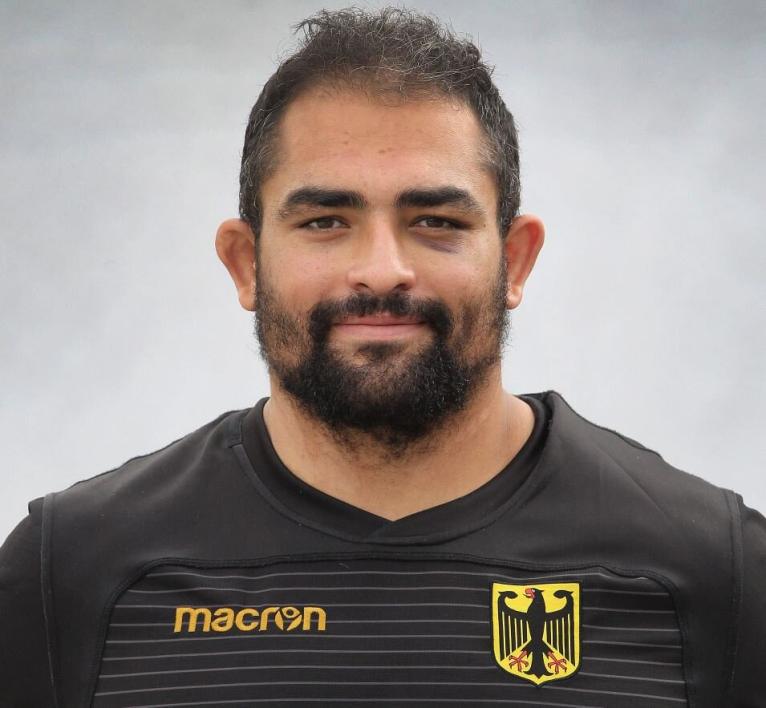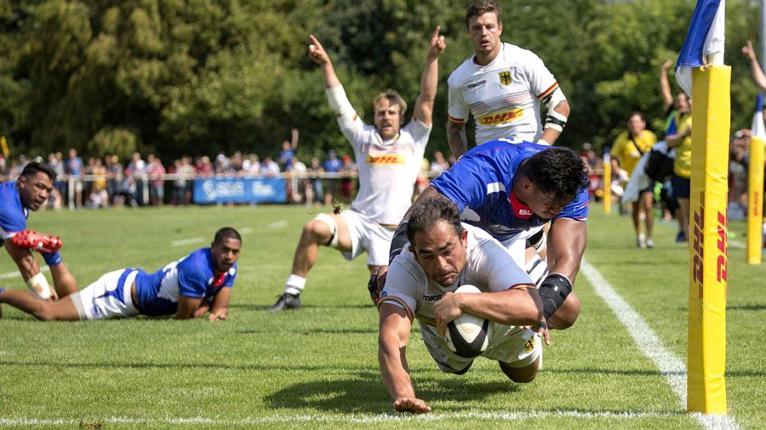How an unemployed German prop got dropped in at the deep end at an English rugby superpower

When Samy Füchsel received the call to go to England, there was scant time for nerves to kick in.
Germany defence and forwards coach, Mouritz Botha, had learned of a tighthead shortage at Saracens and asked his prop to cut a video to show his one-time employers.
Füchsel did not expect anything to come of it. Unlike many of his former Heidelberger RK (HRK) team-mates, he had not chased an overseas contract when Hans-Peter’s Wild’s decision to pull funding for the club and his eponymous academy this summer left them unemployed.
Instead, Füchsel relocated to Frankfurt to complete an apprenticeship in sports and fitness sales, commuting back to Heidelberg three times a week to train with the national team as they prepared for the Rugby World Cup Repechage in Marseille, which starts on Sunday.
Botha’s faith in his charge’s ability ultimately proved founded and one Friday in late September the 26-year-old was given less than 48 hours’ notice to board a flight to the UK.
“Mouritz called me on a Friday and said ‘are you ready to go to London on Sunday?’” Füchsel tells RugbyPass. “At first I was a bit shocked and I had to check some stuff in Frankfurt, that it was alright that I could go.
“So, I was busy organising all this stuff so I couldn’t really focus on the flight but when I arrived there, of course, I was a little bit nervous.”
Füchsel had tried his luck abroad once before, spending time with French club SC Albi in Pro D2 two years previously, but this was a step up, and into the unknown.

On the drive out to Saracens’ training base near St Albans, butterflies began to flutter in his stomach as the realisation set in that he would be rubbing shoulders with giants of the international game, players he had only previously encountered on television.
What would Owen Farrell or Billy and Mako Vunipola make of the boy from Berlin?
He needn’t have worried. “The players were so nice to me, I felt so welcome from the first minute,” Füchsel says.
“Actually all my fears and my doubts vanished from the first second and I could enjoy my time pretty soon. It was pretty good.”

He adds: “It was pretty funny, you have guys like Will Skelton come to you in a really friendly way, and they cheer you up and ask you what you’re doing here.
“They showed so much interest, every player – the Vunipolas, Farrell – everybody was asking me what I’m doing here and we got on really well.”
Füchsel admits that, despite the warm welcome he received in St Albans, it took until the third day of training to feel “normal” in his surroundings.
The prop was sold to Saracens as a dynamic ball-carrier – as highlighted by his impressive score in Germany’s narrow defeat to Samoa in the second leg of their World Cup play-off in July – but his scrummaging was put under the microscope in outer London.
“They showed me some tricks, (and) some things that I need to focus on,” Füchsel admits. According to the 26-year-old, training with Farrell, Skelton and co was the “highest level I’ve ever been”, while his appearance for Saracens’ A team, the Storm, in the Premiership Rugby Shield pushed his fitness to the limit.
“Maybe (playing) Samoa was a bit more physical but the A game was way faster, way quicker,” he says. “So, it was really intense.
“I played 30 minutes, I came on in the second half and I tried to work as hard as I can and I was pretty, pretty done after those 30 minutes.”

Off the pitch, Füchsel’s trip included two trips to England’s capital, one on a team social to the Comedy Club and another to see some sights – he was as disappointed as many back-bench Conservative MPs to find Big Ben draped in scaffolding.
He has remained in email contact with Storm head coach Adam Powell, and it seems he made a good impression. “For a prop he’s got good acceleration,” Powell says.
“He scrummed well but that will be something for him to develop. But he’s a good mobile prop and we enjoyed having him, and hopefully he kicks on and Germany can upset the odds and qualify for the World Cup.”
Ultimately, qualification for next year’s World Cup is what it is all about for Füchsel and Germany. That is why he has spent most his time since September travelling between Frankfurt and Heidelberg, waking early and getting to bed late at least three times a week.
The hard work will be worth it if Mike Ford, Botha and the rest of the Germany coaching staff can mastermind victory over Hong Kong in Marseille on Sunday afternoon, and then defeats of Canada and Kenya later this month.
The carrot on the end of the stick is passage to Japan, and a place in Pool B alongside New Zealand and South Africa. “I probably would lie if I said I knew that I would play against the All Blacks one day and see the haka,” Füchsel says.
“It’s a bit surreal actually to think that it’s possible to face the best team in the world.”

Füchsel insists Germany are focused solely on their first assignment in France against Hong Kong, but arguably the biggest obstacle facing Ford and his coaching panel is one they cannot see: The toll the previous year has taken on their squad.
Twelve months ago, when HRK’s players went on strike at the bidding of Wild in his dispute with the German Rugby Federation (DRV) they had no idea he would pull the plug six months later.
The ensuing year has been a roller coaster for many in the national team.
HRK qualified for, and were expelled from, the Challenge Cup – Wild’s ownership of Stade Francais deemed a conflict of interest by EPCR – while Germany’s hopes of World Cup qualification were reignited by an eligibility row. The DRV was subsequently forced to seek financial help from World Rugby to stage play-off matches and hire a coach, before their former benefactor returned to help inject some funds.

Amid that backdrop a large section of the national squad was made unemployed and in search of contracts has been spread across the globe, from Heidelberg to Houston, Bucharest to Chambéry.
Training sessions have been sparsely attended at times, and it would be understandable if some players were battle weary. “Looking back at the last months you could actually write a book or make a movie out of it, the way it went down,” Füchsel says.
“I think it would be the perfect ending if we made the World Cup.
“It will make the pain of not going to the Challenge Cup, not vanish, but it will ease that pain a lot – and I think it will be a happy end for all of us.”




























































